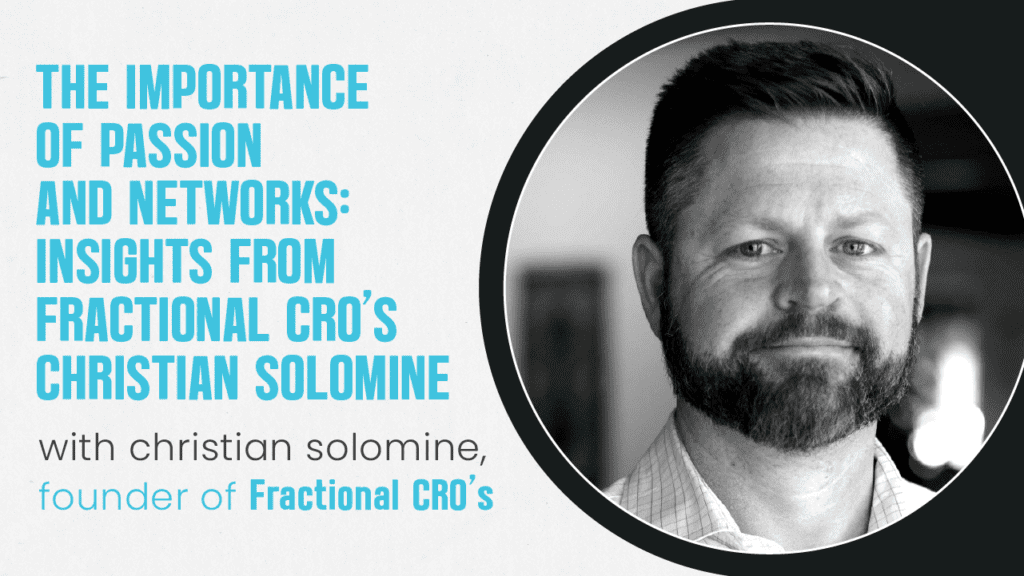Passion is the driving force behind entrepreneurship – another common theme we’re sensing as we progress through these interviews. Afterall, disinterest is the leading cause of dropping the entrepreneurial ball.
Today our own Courtney Botha, from sunny South Africa, chatted to Christian Solomine, CEO & Founder of Fractional CRO. From tech stacks to networks to marketing and sales – no topic went uncovered as we discovered the value of a Chief Revenue Officer. Christian’s passion for his work was evident as he shared his insights on the various aspects of entrepreneurship.
What are three things every entrepreneur should know?
The first thing Christian highlighted – after joking that there are far more than three things every entrepreneur should know – was the importance of being passionate about what you’re trying to do. Whatever the problem you’re looking to solve, product you’re trying to sell, or service you’re looking to provide, you need to be passionate about it.
It’s near impossible to maintain anything that we’re not interested in. The amount of dedication that it takes to get a business off the ground, and keep it there, requires a certain level of passion and enjoyment. Christian’s own business utilizes many of the things that he enjoyed about his previous full-time jobs.
What about the things you need to do, but don’t enjoy or aren’t knowledgeable about?
As an entrepreneur, you don’t have time – and, let’s be honest, as a human, you likely don’t have the energy – to become an expert in every aspect of your business. For example, a freelance artist that hates accounting would benefit more from outsourcing their accounting than from learning how to do it themselves.
The second piece of advice Christian shared ties into this concept. He mentioned that it is crucial for entrepreneurs to build a strong network of people who can offer domain expertise. Christian relies on his network of experts for functions related to his business that he does not specialize in.
He added that having this network is useful so that you have people to bounce ideas off of and suggests that entrepreneurs should leverage their network. Utilize the people you know to reach your targets for building and growing a successful business.
What problem does your business solve and who are its customers?
Christian’s business helps companies in need of a Chief Revenue Officer (CRO) by providing fractional assistance. CRO is a new job function that requires expertise in sales, marketing, and customer success, and that not many people know about. Christian divulged that many people don’t know why it’s different from a VP of Sales or the Head of Marketing.
So, what is the difference?
VP of Sales focuses specifically on sales-related activities such as managing sales teams, setting sales targets, and ensuring revenue goals are met and the Head of Marketing is responsible for developing and executing marketing strategies that increase brand awareness, generate leads, and support sales efforts.
On the other hand, a CRO has a broader scope than a VP of Sales or a Head of Marketing. Essentially, they are responsible for overseeing the entire revenue-generating process of a company, including sales, marketing, and customer success. They focus on revenue growth and profitability by aligning all revenue-generating functions and strategies across the organization.
Many small and medium-sized growing companies or startups may not have the budget for a full-time CRO, but they still need help with the same problems that larger organizations face. Christian’s business provides fractional assistance to help these companies build up the role or perform some of the functions a full-time CRO would do, but at a smaller cost. This allows these companies to get the assistance they need to grow and succeed without breaking their budget.

What inspired you to become an entrepreneur and would you do it again?
Christian was inspired to become an entrepreneur and begin helping other companies to fill the role of CRO (Chief Revenue Officer) by to his past experiences as a VP of sales and SVP of sales.
While working in these roles, he managed accounts, upsold, cross-sold, and acquired new logos for the company, which led to him being offered more opportunities to work with other functional teams like sales ops, marketing, sales engineering, and business development.
Eventually, he realized that the CRO role could be a powerful one that allows the CEO to delegate all revenue-generating functions through one person, rather than having multiple direct reports. However, Christian noticed that many companies do not have the proper processes, procedures, or education in place to make this role successful.
This makes it especially important for hum to help companies understand the potential outcomes of such a role, both good and bad, and prepare them accordingly.
If someone had given you a million dollars when you first started your business, what would you have spent it on?
It took some thinking for Christian to settle on an answer to this question, as his experience was a little unconventional when compared to other fractional workers. He had already been working with other clients periodically for seventeen years.
In the end, he would have focused on building his tech stack and network to engage with people and educate them about his services. While Christian doesn’t think you need a million dollars to do this, per se, it is crucial that you have the right processes and tech stacks in place to support you.
He believes that getting his message out and directing the right kind of inbound traffic to his services would have been extremely beneficial. As a sole proprietor, investing in mechanisms specific to his offer is essential for success.
What is your proudest accomplishment as an Entrepreneur?
The thing that makes Christian feel most proud in his field, is being recommended to other peers in the space by companies that he does fractional work with. This lets him know that they think he did good work for them. It’s a nudge that they find Christian adds value and believe it’s worth sharing with others.
Sometimes, companies that you work with may not outright tell you that they admire or appreciate work that you’ve done for them. This could be for any number of reasons, perhaps they don’t want to lose their leverage with you, Christian commented. If you know how much they value and “need” you, it may be more difficult for them to effectively negotiate future work.
That’s why Christian values when companies refer someone else to him, he sees this as a validation of his work and reputation, which is especially meaningful in a field where he is not a full-time employee and may be seen more as a consultant or fractional worker.
There you have it! All the ingredients, tools, and secret sauces that Christian Solomine utilized to achieve success with Fractional CRO. Do you have a few entrepreneurial tricks up your own sleeve? We’d love to chat about them with you! Connect with us today so that we can get your own recipe for success into the hands of some future founders.


